Papers by Ankit Kumar
Geo: Geography and Environment, 2024
Jugaad is an Indian name for versatility and improvisation, a sensibility for improvisation, an a... more Jugaad is an Indian name for versatility and improvisation, a sensibility for improvisation, an ability for improvisation and an enabling of improvisation. This paper proposes the idea of Jugaad Infrastructure for versatile socio-material infrastructure arrangements that inhabit and thrive in the messy aesthetics of everyday life. It does so by extending the focus of infrastructure geographies from 'big stuff' to little devices such as solar lamps that gain significance when deployed in big numbers. The paper advances two ideas. First, it argues that jugaad circumvents the formal-informal boundary set by designers. By piercing this boundary, jugaad affords more fluid socio-material relationships involving infrastructures and their users. In so doing, jugaad affords versatility. Second, it develops the idea

International Development Planning Review, 2024
The Sustainable Development Goals (SDGs) represented a key landmark in collaboration and shared a... more The Sustainable Development Goals (SDGs) represented a key landmark in collaboration and shared agenda-setting to address global challenges across scales and geographies. However, despite initial optimism that measurable goals would support accountability and transparency in development, progress towards realising goals has been mixed. Global development agendas increasingly face challenges from the intensification of climate change, the return of populism and ethnonationalism, and a deepening of inequalities at intra-and international scales. This article interrogates the priorities that must inform a critical post-SDG development agenda. To think towards this, we first explore three questions of the development agenda: 1) can development be sustainable? 2) Can development be delivered through markets? And 3) can development be 'global'? To address these tensions and take a first step towards a more critical post-2030 agenda, we call for a focus on spatialities, multiplicities and historicities of development.
Dialogues in Human Geography, 2023
The Anthropocene and associated sense of crises, most prominently climate change, have opened up ... more The Anthropocene and associated sense of crises, most prominently climate change, have opened up an urgency versus justice dilemma. While an epochal thinking drives the urgency, it is essential to attend to the ruptures illustrated by historical events like colonisation that shape the fabric of the Anthropocene and its impacts. Historical patterns of extraction and racialisation that underline the Anthropocene and climate change fit neatly into the schema for contemporary and future energy transitions shaped by an apolitical discourse of urgency and emergency. Attending to the historical ruptures helps root universal and apolitical urgency in justice for/from particular places and peoples and reframe ideas like climate emergency and climate crisis as more accurate climate justice emergency and climate justice crisis.

Geography Compass, 2022
The Anthropocene has thrown at us a challenge of balancing urgency and justice. Urgency brought a... more The Anthropocene has thrown at us a challenge of balancing urgency and justice. Urgency brought about by myriad environmental crises, most prominently being climate change, and justice that any adequate response to these crises needs to be rooted in. This is a dilemma because we need pathways for urgent action on climate mitigation and energy transitions while centring the slow and considered work that historical and contemporary justice questions demand. This is because while the Anthropocene calls humans to unite, its impacts have been, are, and will be, felt differently. The Anthropocene narrative's framing of a universal humanity connects to a long and dangerous history of what is human and what qualifies as humanity, a history of colonising, racializing, and dehumanising black, brown, and indigenous bodies around the world. We need narratives of the Anthropocene that confirm the importance of decolonising political, economic, and scientific institutions, not to deny urgency, but to foster a more political Anthropocene that creates space for new narratives of justice. The question then, that this paper initiates,
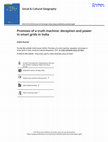
Social and Cultural Geography, 2022
Smartness in smart grids and cities is an assemblage of devices that produce data as truth claims... more Smartness in smart grids and cities is an assemblage of devices that produce data as truth claims and deploy new modes of governance focused on chal (deception, cunning) and bal (power) with a promise to reduce losses and maximise profits. Building on postcolonial geographies, the paper argues that chal (छल) and bal (बल) are central to understanding the deployment of smart grids in India. Managers use the idea of the practice of chal and bal by political citizen-subjects, and the disorder of governance this causes, to justify the deployment of smart infrastructure. However, the paper shows that smartness can be understood as automation, and deployment from a distance, of chal and bal by a capital-state nexus to counter the chaliya (छलिया) (deceptive/cunning/cheat/trickster) citizen-subjects. Planners and implementers expect data and digitalisation to bring order by (re)training and excluding lower-level workers and consumers. These promise to reduce resource losses, making electricity utilities profitable. Rather than being distinctly corporate or clearly in the domain of the state, smart is situated at the fracture of public and private resources, and political and civil spaces. By developing a postcolonial analysis of smart grids and focusing on the ‘inbetweeners’, electricity utility staff and middle-class citizen-subjects, the paper furthers the understanding of smartness and subalternity of elites.
The problem of solar waste from off-grid technologies is attracting increasing attention. This ch... more The problem of solar waste from off-grid technologies is attracting increasing attention. This chapter argues that solar waste represents multiple matters of concern; it is a problem of pollution, resource, and social ruin all together. It suggests that while an energy justice framework is well suited to identify issues of distributional, procedural, and recognition justice in relation to solar waste-what we refer to as "afterlives"-there is a need to engage with postcolonial theories of ethics in order to better grapple with different kinds of social ruins solar waste may represent-what we refer to as 'lives after'.

Antipode, 2021
Community renewable energy (CRE) represents a growing empirical and academic turn towards communi... more Community renewable energy (CRE) represents a growing empirical and academic turn towards community-based sustainability and climate change interventions. This paper brings together postcolonial theory and CRE for the first time to outline fundamental tensions in the conceptualisation and application of the idea of community. The understanding of community within the CRE discourse is largely: (1) location-based; and/or (2) a community of choice that is consciously opted into. Driven by postcolonial theory, this paper counterpoises both as a form of community as contract against an idea of community as solidarity. Its central thesis is that actually existing community, contrary to how the bulk of CRE literature commonly understands it, is a combination of bonds of solidarity and emergent purposes. The paper conceptualises community as fluid bonds of solidarity that align and realign differently around different purposes. R esum e: L' energie renouvelable communautaire (CRE) repr esente de plus en plus un virage empirique et acad emique en direction d'interventions communautaires de d eveloppement durable et de lutte contre le changement climatique. Cet article fait dialoguer pour la premi ere fois la th eorie postcoloniale et l'approche CRE afin de souligner les tensions fondamentales dans la conceptualisation et l'application de l'id ee de communaut e. La compr ehension de la communaut e dans le discours de la CRE est largement bas ee sur: (1) le local, le lieu, ou la localisation; et / ou (2) une communaut e de choix qui est d elib er ement choisie. Inspir e par la th eorie postcoloniale, cet article s'oppose a ces deux acceptations de la communaut e comme contrat pour proposer l'id ee de communaut e comme solidarit e. La th ese centrale de l'article est que contrairement au sens donn e la plupart du temps par la litt erature traitant de la CRE, la communaut e r eellement existante est une combinaison de liens de solidarit e et de finalit es emergentes. L'article conceptualise la communaut e comme des liens fluides de solidarit e qui s'alignent et se r ealignent diff eremment autour de diff erents objectifs.

Transforming rural light and dark under planetary urbanisation: Comparing ordinary countrysides in India and the UK
Transactions of the Institute of British Geographers, 2020
Contemporary global lightscapes are becoming increasingly complex and varied, creating an unusual... more Contemporary global lightscapes are becoming increasingly complex and varied, creating an unusual geography of technological development and diffusion that defies many easy narratives of global interconnectivity. Specifically, new LED lighting technologies are being created through rural experimentation in both Global North and Global South. This makes lighting, and darkness, an interesting lens through which to intervene in debates on the relationship between city, countryside, and planet, specifically addressing the theoretical developments of comparative urbanism and planetary urbanisation. Heading calls to develop conceptual material from both Global North and Global South, we use case studies from Bihar (India) and the North Pennines (UK) to argue that the changing lighting technologies and practices show how “ordinary countrysides” are contributing to new planetary ways of living. We argue that while there are differences in how darkness and the implementation of artificial lighting are perceived in these sites, there are similarities that reveal an ongoing rural form of planetary living, outside the claims of urbanisation. Particularly, rural lives are marked by a closer connection to the planet, as expressed through experiences of rural darkness. Furthermore, in both sites the tenuous grasp on infrastructure and state services seems to reveal a shared rural experience. These findings suggest shared rural experiences of globalisation, but that the socio‐spatial contexts of places remain important in understanding their location within global systems. Furthermore, we join recent calls to suggest that further exploration of the difference between “global” and “planetary” might add nuance to theoretical trends in urban studies, rural studies, and geography.
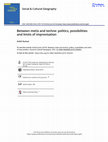
Social & Cultural Geography, 2019
Geographers, especially those working in developing country contexts have often encountered impro... more Geographers, especially those working in developing country contexts have often encountered improvisation because it plays a critical social and cultural role. Engaging with anthropologist James Scott’s conceptualisation of metis – contextual, practical and flexible skills and knowledge – and techne – universal technical knowledge – this paper furthers the geographical scholarship on the politics of improvisation.
The paper makes three main contributions. First, using metis and techne, it provides a new conceptual repertoire for making sense of improvisation. The paper places improvisation at the nexus of metis and techne. Second, it pushes the understanding of the morality of improvisation by attending to the role of relationships of power in morally and materially legitimising improvisations. Third, although states and experts celebrate and actively engage with improvisation, this paper demonstrates that they also create limits and boundaries for improvisation. These limits demonstrate a contradiction in experts’ actions.
This paper is based on a nine months ethnographic research on two energy projects carried out in 2012–13 in five villages in Bihar, an eastern state of India. It used participant observations, home tours, interviews and group discussions.
RÉSUMÉ
Les géographes, tout particulièrement ceux qui travaillent dans le contexte des pays en développement, ont souvent abordé la notion d’improvisation pour son rôle social et culturel essentiel. En discutant les conceptualisations de mètis par James Scott (1998) – en tant qu’ensemble de compétences et de savoirs contextuels, pratiques et flexibles – et de technè – en tant que savoir technique universel –, cet article fait progresser la recherche géographique sur les politiques de l’improvisation.
L’article y contribue de trois façons. Il propose dans un premier temps un nouveau répertoire conceptuel pour comprendre l’improvisation en faisant appel aux concepts de mètis et de technè. L’article place le concept d’improvisation à la rencontre de la mètis et de la technè. L’article améliore dans un deuxième temps la compréhension de la l’improvisation et de sa moralité en étudiant le rôle des relations de pouvoir dans la légitimation morale et matérielle des improvisations. Dans un troisième temps, cet article montre que, malgré le fait que les États et experts encensent l’improvisation et y participent activement, ceux-ci créent aussi des limites et des barrières à l’improvisation. Ces limites révèlent les contradictions au sein des actions des experts.
Cet article est réalisé à partir de neuf mois de recherches ethnographiques autour de deux projets énergétiques menés dans le période 2012-2013 dans cinq villages du Bihar, un État de l’Est de l’Inde. Il utilise comme méthodes l’observation participante, des visites d’espaces domestiques, des entretiens et des discussions de groupes.
RESUMEN
Los geógrafos, especialmente aquellos que trabajan en países en desarrollo, a menudo se han encontrado con la improvisación porque desempeña un papel social y cultural crítico. Elaborando sobre la conceptualización de metis (habilidades y conocimientos contextuales, prácticos y flexibles) y techne (conocimiento técnico universal) de James Scott, este artículo promueve la investigación geográfica sobre las políticas de la improvisación.
El artículo hace tres contribuciones principales. Primero, utilizando metis y techne, proporciona un nuevo repertorio conceptual para dar sentido a la improvisación. El artículo coloca la improvisación en el nexo de metis y techne. En segundo lugar, estimula la comprensión de la moralidad de la improvisación prestando atención al papel de las relaciones de poder en la legitimación moral y material de las improvisaciones. Tercero, aunque los Estados y los expertos celebran y se involucran activamente con la improvisación, este artículo demuestra que estos también crean delimitaciones y fronteras para la improvisación. Estas delimitaciones demuestran una contradicción en las acciones de los expertos.
Este artículo se basa en una investigación etnográfica de nueve meses sobre dos proyectos de energía llevados a cabo entre 2012 y 2013 en cinco aldeas en Bihar, un estado del este de India. Se utilizaron la observación participante, visitas a hogares, entrevistas y discusiones grupales.
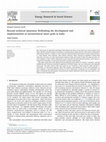
Energy Research and Social Science (ERSS), 2019
How smart grids are understood and defined will influence the kinds of smart grids users will enc... more How smart grids are understood and defined will influence the kinds of smart grids users will encounter in the future and their potential impacts. Practitioners and policymakers largely perceive smart grids as technological interventions. However, a number of social, financial and governmental interventions can also make grids smart, i.e., more efficient, more responsive, more inclusive and more robust. Drawing on qualitative research done using elite interviews, site visits and document analysis of eight micro-grids in India, this paper provides concrete examples of what could be understood as social, financial and governmental smartness, and in doing so, broadens the knowledge on smart grids beyond the technical understanding. This paper argues that social, financial and governmental interventions are central to 'smartness', and that multifaceted and relational sociotechnical approaches will build cheaper, just, more democratic and sustainable smart grids. The paper observes that smart grids are not conceived as smart grids but rather develop incrementally. An incremental approach, rather than pushing a premeditated set of ideas and technologies, reduces adoption of non-contextual interventions as well as unnecessary investments in new technologies. The paper recommends that policymakers and practitioners should understand and develop smart grids as sociotechnical and incremental grids.
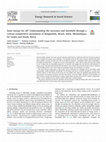
Energy Research and Social Science, 2019
Lanterns, homes systems, hot water systems and micro-grids based on small-scale solar have become... more Lanterns, homes systems, hot water systems and micro-grids based on small-scale solar have become prominent ways to address the energy access challenge. As momentum grows for this form of energy transition this paper draws together research on small-scale solar in six different countries – Bangladesh, Brazil, India, Mozambique, Sri Lanka and South Africa – to argue for a need to understand how, when, and for whom solar provides energy access. It argues that an assemblage perspective can provide vital insights into the diversity and dynamism of energy access. The paper demonstrates that the diverse ways in which solar provides energy access is a function of the flexibility/fixity of the socio-technical assemblage and the de/centralisation of agency. The central thesis of this paper is that energy access is fluid and ever changing and we need fluid, easily maintainable, locally modifiable 'assemblages' for providing such access. Using this perspective, we find three common features of solar energy access across our case studies. First, there are significant gaps between what solar projects are designed to achieve and what they deliver, which are highly contingent on the flexibility of their structure and the decentralisation of agency within them. Second, access needs to endure continuously. Third, to foster enduring access, projects should embed logics of improvisation. This paper is based on six separate qualitative research projects conducted during 2010-2016. It draws data from 482 interviews, 91 home tours and 12 group discussions.
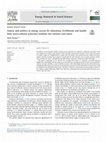
Energy Research & Social Science, 2018
The rhetoric on development benefits of energy access often focuses on education, livelihoods and... more The rhetoric on development benefits of energy access often focuses on education, livelihoods and health. Using case studies of two energy access projects in India, this paper demonstrates that these claims, while true in part, are neither simple nor straightforward. It argues that pre-existing socio-cultural processes mediate the development outcomes of energy access projects. In particular, the roles of gender, socioeconomic positions and the local economy are vital in understanding the links between education, livelihoods, health and energy. This paper is important for two reasons. First, working with culture as a mediator, it provides nuanced insights into relationships between energy access and three key development goals. Second, by presenting this analysis, the paper identifies a need for further research on the relationships between socio-cultural processes, development and energy access and, how by keeping these processes in mind, the benefits of energy access could be extended to less privileged social groups. This paper is based on a nine-month long ethnographic research in five villages in India's Bihar state. Home tours, interviews, participant observations and group discussions were used to collect the data.
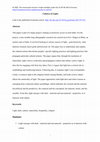
This paper is part of a larger project, looking at electricity access in rural India. For the pro... more This paper is part of a larger project, looking at electricity access in rural India. For the project, a nine months long ethnographic research was carried out in five villages in Bihar, an eastern state of India. It involved looking at various sources of light – grid electricity, solar lanterns, biomass micro-grids and kerosene oil. The paper tries to understand, and explain, the cultural notions that dictate peoples’ specific lighting practices and lighting practices that propagate particular cultural notions. The paper argues that, through the mediation of materiality, light cultures (cultivates and propagates) culture and culture cultures light. It does this by engaging with three key ideas. First, it argues that light has a critical role in establishing and reinforcing honour. Following this, it examines light’s role in hospitality. Lastly, it connects light to the religious beliefs among Hindus, and looks at how culture affects the materiality of light. The paper approaches what light does and what it means as emerging from a material-culture assemblage, which embodies the external and the internal, the political and the productive, the corporal and the conceptual, the material, moral, and the sensible. From this, light emerges with dual – material and non-material – properties, as it interacts with culture.
Book Chapter by Ankit Kumar
Love in the Time of Climate Crisis: Climate Justice through a Universalism of the Oppressed
Urban Climate Justice: Theory, Praxis, Resistance, 2023
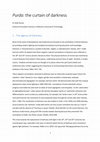
Rethinking Darkness, 2020
This chapter explores the ambiguous cultural space that darkness occupies and creates in Indian v... more This chapter explores the ambiguous cultural space that darkness occupies and creates in Indian villages. Darkness fosters practices that lack cultural acceptance; it is therefore negative for some, but positive for those engaging in these practices as it gives them refuge from the society. While the curtain of darkness produces a space that the subaltern ‘other’ uses to passively and actively resist the social boundaries, it also creates an affect where inhabiting this space becomes a signifier of moral perversion.
Those inhabiting darkness are understood as socially degraded and morally corrupt as they engage in smoking, drinking or premarital love. Therefore, darkness has a double effect. One the one hand, it causes and exacerbates ‘othering’. The gendered and casteised ‘other’, that is forced to inhabit darkness, is considered morally degraded and of a lower honour status. On the other hand, darkness gives the subaltern ‘other’ an opportunity to subvert the social norms and conventions. It becomes a space for love and freedom. The chapter is primarily based on a nine-month ethnographic research into various sources of electricity and illumination in five villages in the Indian state of Bihar between 2012 and 2013.
Energy for all, energy access, equity, power relationships, Sustainable Energy for All (SE4ALL)
Book Reviews by Ankit Kumar
Book review: Coles, A., Gray, L. and Momsen, J., editors, 2015: The Routledge Handbook of Gender and Development
The Routledge research companion to energy geographies
Age of Entanglement: German and Indian Intellectuals across Empire by Kris Manjapara
n this book, Kris Manjapara sets out to explore patterns of connection linking German and Indian ... more n this book, Kris Manjapara sets out to explore patterns of connection linking German and Indian intellectuals from the nineteenth century to the years after the Second World War. The author attempts to trace the intersecting ideas and careers of a diverse collection of individuals from South Asia and Central Europe who shared ideas, formed networks, and studied one another’s worlds.
Conference Presentations by Ankit Kumar

Electrification history of India: the making of a political project
This paper looks at the history of electricity and electrification in India through the lenses of... more This paper looks at the history of electricity and electrification in India through the lenses of development and politics. Based on archival research and a nine month long ethnographic fieldwork in five villages in the Bihar state of India, the paper tries to theorise the different imaginaries of electricity and electrification through a continuum of three development projects. These development projects and their electricity imaginaries can be seen as separate stages based on their emergence at different times and initiations at different scales but also as a continuum due to the social, material and historical overlaps that they create with each other. In the first stage, the paper discusses the modernisation of India, which was started as a project for the nation state and resulted in formation of a modern national electricity grid. However, the uneven nature of this process left open spaces of missing development resulting in localised development projects, here theorised as part of the second stage. These projects started occupying the open spaces to make peoples’ claims on the national development project and the grid. As sustainable development emerged as a global development project, the third stage of electrification materialised in India in the form of decentralised, low carbon, microgeneration projects. However, these development projects were neither simple nor straightforward. To understand the associated entanglements, the paper discusses how social and political negotiations took place on the ground and how these projects and their imaginaries unravelled in peoples’ daily lives.









Uploads
Papers by Ankit Kumar
The paper makes three main contributions. First, using metis and techne, it provides a new conceptual repertoire for making sense of improvisation. The paper places improvisation at the nexus of metis and techne. Second, it pushes the understanding of the morality of improvisation by attending to the role of relationships of power in morally and materially legitimising improvisations. Third, although states and experts celebrate and actively engage with improvisation, this paper demonstrates that they also create limits and boundaries for improvisation. These limits demonstrate a contradiction in experts’ actions.
This paper is based on a nine months ethnographic research on two energy projects carried out in 2012–13 in five villages in Bihar, an eastern state of India. It used participant observations, home tours, interviews and group discussions.
RÉSUMÉ
Les géographes, tout particulièrement ceux qui travaillent dans le contexte des pays en développement, ont souvent abordé la notion d’improvisation pour son rôle social et culturel essentiel. En discutant les conceptualisations de mètis par James Scott (1998) – en tant qu’ensemble de compétences et de savoirs contextuels, pratiques et flexibles – et de technè – en tant que savoir technique universel –, cet article fait progresser la recherche géographique sur les politiques de l’improvisation.
L’article y contribue de trois façons. Il propose dans un premier temps un nouveau répertoire conceptuel pour comprendre l’improvisation en faisant appel aux concepts de mètis et de technè. L’article place le concept d’improvisation à la rencontre de la mètis et de la technè. L’article améliore dans un deuxième temps la compréhension de la l’improvisation et de sa moralité en étudiant le rôle des relations de pouvoir dans la légitimation morale et matérielle des improvisations. Dans un troisième temps, cet article montre que, malgré le fait que les États et experts encensent l’improvisation et y participent activement, ceux-ci créent aussi des limites et des barrières à l’improvisation. Ces limites révèlent les contradictions au sein des actions des experts.
Cet article est réalisé à partir de neuf mois de recherches ethnographiques autour de deux projets énergétiques menés dans le période 2012-2013 dans cinq villages du Bihar, un État de l’Est de l’Inde. Il utilise comme méthodes l’observation participante, des visites d’espaces domestiques, des entretiens et des discussions de groupes.
RESUMEN
Los geógrafos, especialmente aquellos que trabajan en países en desarrollo, a menudo se han encontrado con la improvisación porque desempeña un papel social y cultural crítico. Elaborando sobre la conceptualización de metis (habilidades y conocimientos contextuales, prácticos y flexibles) y techne (conocimiento técnico universal) de James Scott, este artículo promueve la investigación geográfica sobre las políticas de la improvisación.
El artículo hace tres contribuciones principales. Primero, utilizando metis y techne, proporciona un nuevo repertorio conceptual para dar sentido a la improvisación. El artículo coloca la improvisación en el nexo de metis y techne. En segundo lugar, estimula la comprensión de la moralidad de la improvisación prestando atención al papel de las relaciones de poder en la legitimación moral y material de las improvisaciones. Tercero, aunque los Estados y los expertos celebran y se involucran activamente con la improvisación, este artículo demuestra que estos también crean delimitaciones y fronteras para la improvisación. Estas delimitaciones demuestran una contradicción en las acciones de los expertos.
Este artículo se basa en una investigación etnográfica de nueve meses sobre dos proyectos de energía llevados a cabo entre 2012 y 2013 en cinco aldeas en Bihar, un estado del este de India. Se utilizaron la observación participante, visitas a hogares, entrevistas y discusiones grupales.
Book Chapter by Ankit Kumar
Those inhabiting darkness are understood as socially degraded and morally corrupt as they engage in smoking, drinking or premarital love. Therefore, darkness has a double effect. One the one hand, it causes and exacerbates ‘othering’. The gendered and casteised ‘other’, that is forced to inhabit darkness, is considered morally degraded and of a lower honour status. On the other hand, darkness gives the subaltern ‘other’ an opportunity to subvert the social norms and conventions. It becomes a space for love and freedom. The chapter is primarily based on a nine-month ethnographic research into various sources of electricity and illumination in five villages in the Indian state of Bihar between 2012 and 2013.
Book Reviews by Ankit Kumar
Conference Presentations by Ankit Kumar
The paper makes three main contributions. First, using metis and techne, it provides a new conceptual repertoire for making sense of improvisation. The paper places improvisation at the nexus of metis and techne. Second, it pushes the understanding of the morality of improvisation by attending to the role of relationships of power in morally and materially legitimising improvisations. Third, although states and experts celebrate and actively engage with improvisation, this paper demonstrates that they also create limits and boundaries for improvisation. These limits demonstrate a contradiction in experts’ actions.
This paper is based on a nine months ethnographic research on two energy projects carried out in 2012–13 in five villages in Bihar, an eastern state of India. It used participant observations, home tours, interviews and group discussions.
RÉSUMÉ
Les géographes, tout particulièrement ceux qui travaillent dans le contexte des pays en développement, ont souvent abordé la notion d’improvisation pour son rôle social et culturel essentiel. En discutant les conceptualisations de mètis par James Scott (1998) – en tant qu’ensemble de compétences et de savoirs contextuels, pratiques et flexibles – et de technè – en tant que savoir technique universel –, cet article fait progresser la recherche géographique sur les politiques de l’improvisation.
L’article y contribue de trois façons. Il propose dans un premier temps un nouveau répertoire conceptuel pour comprendre l’improvisation en faisant appel aux concepts de mètis et de technè. L’article place le concept d’improvisation à la rencontre de la mètis et de la technè. L’article améliore dans un deuxième temps la compréhension de la l’improvisation et de sa moralité en étudiant le rôle des relations de pouvoir dans la légitimation morale et matérielle des improvisations. Dans un troisième temps, cet article montre que, malgré le fait que les États et experts encensent l’improvisation et y participent activement, ceux-ci créent aussi des limites et des barrières à l’improvisation. Ces limites révèlent les contradictions au sein des actions des experts.
Cet article est réalisé à partir de neuf mois de recherches ethnographiques autour de deux projets énergétiques menés dans le période 2012-2013 dans cinq villages du Bihar, un État de l’Est de l’Inde. Il utilise comme méthodes l’observation participante, des visites d’espaces domestiques, des entretiens et des discussions de groupes.
RESUMEN
Los geógrafos, especialmente aquellos que trabajan en países en desarrollo, a menudo se han encontrado con la improvisación porque desempeña un papel social y cultural crítico. Elaborando sobre la conceptualización de metis (habilidades y conocimientos contextuales, prácticos y flexibles) y techne (conocimiento técnico universal) de James Scott, este artículo promueve la investigación geográfica sobre las políticas de la improvisación.
El artículo hace tres contribuciones principales. Primero, utilizando metis y techne, proporciona un nuevo repertorio conceptual para dar sentido a la improvisación. El artículo coloca la improvisación en el nexo de metis y techne. En segundo lugar, estimula la comprensión de la moralidad de la improvisación prestando atención al papel de las relaciones de poder en la legitimación moral y material de las improvisaciones. Tercero, aunque los Estados y los expertos celebran y se involucran activamente con la improvisación, este artículo demuestra que estos también crean delimitaciones y fronteras para la improvisación. Estas delimitaciones demuestran una contradicción en las acciones de los expertos.
Este artículo se basa en una investigación etnográfica de nueve meses sobre dos proyectos de energía llevados a cabo entre 2012 y 2013 en cinco aldeas en Bihar, un estado del este de India. Se utilizaron la observación participante, visitas a hogares, entrevistas y discusiones grupales.
Those inhabiting darkness are understood as socially degraded and morally corrupt as they engage in smoking, drinking or premarital love. Therefore, darkness has a double effect. One the one hand, it causes and exacerbates ‘othering’. The gendered and casteised ‘other’, that is forced to inhabit darkness, is considered morally degraded and of a lower honour status. On the other hand, darkness gives the subaltern ‘other’ an opportunity to subvert the social norms and conventions. It becomes a space for love and freedom. The chapter is primarily based on a nine-month ethnographic research into various sources of electricity and illumination in five villages in the Indian state of Bihar between 2012 and 2013.
The primary findings of my 9 month long field work in rural India reveal some key points for the planning and implementation of BoP projects. Firstly, it is critical to understand the priorities of the target BoP community. It is important to recognize that we can’t sell what ‘we’ have, it is important to sell what ‘they’ need. Secondly, a very robust maintenance chain needs to be in place for whatever product we plan to introduce. Thirdly, urgent work needs to be done on batteries to increase their life and reduce their costs.
Findings of of a 9 month long enthnographic work in rural India reveal that most people associate positive connotations with light and negative with darkness. Light is believed to denote good, auspiciousness, prosperity, protection, hope while darkness represents evil, inauspicious, decline, danger, hopelessness. One theme that has come up strongly is that light is related to people’s honor. The social norms are such that the presence of light in or outside people’s homes upholds the honor and the absence brings dishonor. The quality and quantity of light also seem to be honor indicators.
One way to escape this moral dilemma may be to try to be truthful to the respondents. However, it may also be important to strike a critical balance in being truthful and being tactful. The ultimate aim should be to not raise false hopes.
https://indiasmartgrids.com/
Dilemmas of Energy Transitions in the Global South brings together theoretical and empirical contributions focused on rethinking energy transitions conceptually from and for the global South, and highlights issues of justice and inclusivity. It argues that while urgency is critical for energy transitions in a climate-changed world, we must be wary of conflating goals and processes, and enquire what urgency means for due process. Drawing from a range of authors with expertise spanning environmental justice, design theory, ethics of technology, conflict and gender, it examines case studies from countries including Bolivia, Sri Lanka, India, The Gambia and Lebanon in order to expand our understanding of what energy transitions are, and how just energy transitions can be done in different parts of the world. Overall, driven by a postcolonial and decolonial sensibility, this book brings to the fore new concepts and ideas to help balance the demands of justice and urgency, to flag relevant but often overlooked issues, and to provide new pathways forward.
This volume will be of great interest to students and scholars of energy transitions, environmental justice, climate change and developing countries.
The Open Access version of this book, available at https://doi.org/10.4324/9780367486457 has been made available under a Creative Commons Attribution-Non Commercial-No Derivatives 4.0 license.